
Jody Agius Vallejo
Jody Agius Vallejo is Associate Professor of Sociology at the University of Southern California. She will be associate director of the Center for the Study of Immigrant Integration in Fall 2016. Her research concentrates on the Latino middle class, Latino elites, and patterns of wealth accumulation among Latinos and Chinese Americans . Her book, Barrios to Burbs: The Making of the Mexican American Middle Class (Stanford University Press, 2012) examines mobility mechanisms, socioeconomic incorporation, racial/ethnic and class identities, patterns of giving back to kin and community, and civic engagement among middle-class Mexican Americans. Her second book, in progress, investigates the rise of the contemporary Latino elite. Her research has been funded by The National Science Foundation, The American Association of University Women, The Lusk Center for Real Estate, the American Sociological Association’s Fund for the Advancement of the Discipline, the John Randolph and Dora Haynes Foundation, the UC Davis Center for Poverty Research, and the USC Office of the Provost. She has published in peer-reviewed journals such as Social Forces, Ethnic and Racial Studies, Latino Studies, Social Science Research, City & Community, and Sociological Forum. Her research has received coverage in print, radio, and television including the New York Times, Los Angeles Times, NBC Latino, La Opinión, BBC World News, BBC Mundo, Agencia EFE, ABC’s Vista LA, OC Weekly, NPR, KCRW and KCPP.
Less ![]()
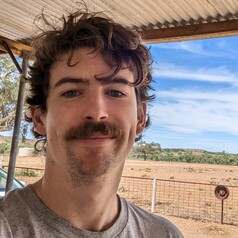
Joe Atkinson
Postdoctoral Researcher, Department of Biology, Aarhus University
Joe is a plant community ecologist interested in using functional traits to improve the conservation and restoration of natural ecosystems.
Less ![]()

Joe Barrett
Associate Professor -- School Health Policy & Health and Physical Education Pedagogy, Brock University
Less ![]()

Joe Cable
Senior Lecturer in PR Media and Communications, Media, Swansea University
Jonathan joined Swansea University as Senior Lecturer in PR, Media, and Communications in 2022 where he teaches across a variety of undergraduate and postgraduate modules mainly focusing on public relations, sport, and journalism.
Alongside his teaching Jonathan’s research career originally began by examining protest and its utilisation for pollical communication before shifting focus to concentrate more fully on the world of sport and its relationship with wider society. His work includes: the use of football related clickbait on social media by major media organisations; constructions of nationalism among ‘proper football men’; the newspaper representation of England men’s football international Raheem Sterling compared to Sterling’s self-representation on social media; and fan reactions on social media to suspected racism during a football match among others. Due to these expertise he’s been used as a source for media outlets such as The Athletic, BBC Radio Gloucestershire, and French football website SoFoot.
Jonathan is a Fellow of the Higher Education Academy and is an external examiner at Chester University, and Edge Hill University. Jonathan sits on the editorial board of the Football Collective whose aim is to bring critical debate to football, and is a member of the Football Writers Association. He also acts as an Associate Editor for the Sport Section of the academic journal Cogent Social Sciences.
Less ![]()
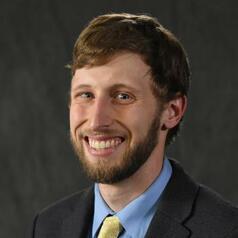
Joe Charbonnet
Assistant Professor of Environmental Engineering, Iowa State University
I am an environmental engineer who protects water from chemical threats and teaches others how to do the same. My research focuses on contaminant fate, transport, and treatment in the environment and engineered water systems. My teaching focuses on aquatic chemistry and technology.
Less ![]()

Joe Duggan
PhD Candidate, Fenner School of Environment and Society, Australian National University, Australian National University
Joe is a program manager, researcher and science communicator. As a program manager he has worked with communities and organisations to codevelop engaging science communication content and build capacity in STEM engagement. His research focusses on cross cultural communication and Sense of Place. Joe is also the creator and co-ordinator of ‘Is This How You Feel?’ A project designed to engage the general public with the human side of climate change.
Less ![]()

Joe Duncan
Clinical Associate Lecturer, Northern Clinical School and Lecturer, Internal Medicine. Rural Clinical School (Northern Rivers), University of Sydney
Dr Joe (Joseph) Duncan is Clinical Associate Lecturer, Northern Clinical School, and Lecturer, Internal Medicine, Rural Clinical School (Northern Rivers), University of Sydney.
Dr Duncan is a specialist respiratory and sleep physician, and has a particular interest in severe asthma.
Less ![]()

Joe Hollis
PhD student in Rural Sociology and Sustainable Agriculture, Iowa State University
Graduate Research Assistant at Iowa State University. Ph.D student co-majoring in Sustainable Ag and Rural Sociology and minoring in Political Science. My interests include adoption of Artificial Intelligence (AI) and precision agriculture tools, agricultural governance and policy, and conservation management. Previous projects include identifying issues, barriers, and opportunities for blockchain technology to improve transparency and provenance in the Scottish dairy supply chain.
Graduate of both The University of London (BA), and The University of Edinburgh (MSc)
Less ![]()
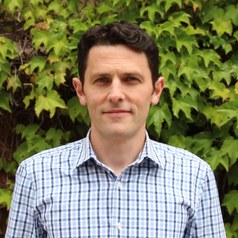
Joe Hurley
Associate Professor, Sustainability and Urban Planning, RMIT University
Dr Hurley is an Associate Professor with the Sustainability and Urban Planning program at RMIT University and member of the Centre for Urban Research. His research focuses on urban planning and urban sustainability issues. Recent research topics include planning systems performance, urban greening, urban sustainability performance assessment, and research-practice exchange. He is deputy lead of the Clean Air and Urban Landscapes hub funded by the the National Environmental Science Program (www.nespurban.edu.au).
Less ![]()

Joe Jackson
Associate Professor in Twentieth-Century and Contemporary English Literature, University of Nottingham
My work faces two of the big, related questions in twenty-first century Britain: how we represent racism and racial justice, and the changing national story of Britain itself. The literary imagination tells us many things about race and nation that statistics or social science research cannot. My approach questions the popular narrative of an increasingly diverse and inclusive Britishness - I look at many things that undermine such a narrative, including the history of racism, the aftermath of the Empire, and the possible disintegration of Britain into its smaller nations.
My research specialism is in late twentieth-century fiction, with a particular emphasis on the Scottish novel, on writing Blackness in post-war Britain, and on Caribbean fiction - areas which have evident, but also surprising and generative, overlaps. I published a book, Writing Black Scotland: Race, Nation and the Devolution of Black Britain (Edinburgh University Press, 2020) where I look at the way the politics of race - in a sense of government policy, in grassroots activism, and in an everyday social context - meet with the peculiar national formations of contemporary Britain. These include the 'master narrative' of Britishness and the stories of Britain's constituent nations like England and Scotland, as well as national affiliations that overspill territorial boundaries.
I also have a research interest in the literary representation of addiction: what literature can tell us both about addiction at the level of the individual people and their experiences, but also what it tells us about society more widely, in history, in attitudes, and as a metaphor for different things.
Less ![]()
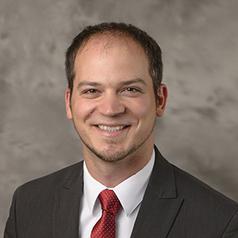
Joe Mazur
Assistant Professor of Economics, Purdue University
Professor Mazur joined the Krannert School of Management at Purdue University in June 2015. He studies industrial organization ("I.O.") and is chiefly interested in the capital investment decisions of firms that behave strategically. Professor Mazur's work in this area combines reduced-form empirical analysis with recent econometric advances in the estimation of dynamic games to study how legal/policy changes and market frictions influence investment incentives. His interests also extend to the analysis of mergers and acquisitions, complementing his professional experience as a corporate financial analyst specializing in industrial M&A.
Less ![]()
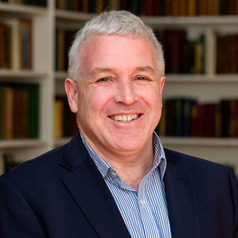
Joe O'Hara
Professor of Education, Dublin City University
Joe O'Hara holds the Chair of Education and is a member of the School of Policy and Practice in the DCU Institute of Education. He is Director of EQI- The Centre for Evaluation, Quality and Inspection and a member of the Centre for Culturally Responsive Evaluation and Assessment at the University of Illinois at Urbana Champaign. Joe O'Hara is a Past President of the Educational Studies Association of Ireland was a member of the The Teaching Council of Ireland from 2012-2016. He was a member of the Board of Directors of the Association for Personal Services Overseas (APSO) from 2002-2004 and represented Ireland on the Council of the European Educational Research Association from 2008 to 2013. Joe O'Hara was Head of the School of Education Studies, DCU from 2010 to 2016. He is a Director and Founding Member of the Irish Evaluation Network and is a member of the Board of the Centre for Talented Youth, Ireland. Joe O'Hara is President of the European Educational Research Association.
Less ![]()
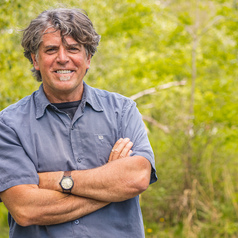
Joe Pavelka
Professor, Department of Health and Physical Education, Mount Royal University
Joe's research focuses on aspects of destination management (both here in Canada and abroad) and marketing and tourism motivation. His past education includes a Bachelor of Arts in Geography (1987) and Honours Bachelors of Outdoor Recreation (1987) both from Lakehead University in Thunder Bay, Ontario. He obtained his Master's in Recreation Administration from the University of Alberta (1990) in Edmonton, and his Doctorate in Geography (2010) from the University of Calgary, studying the resort community evolution from an interdisciplinary approach focusing on amenity migration.
Joe has been teaching in the ETOL program since its inception in 2000. His primary areas of teaching include the three levels of ecotourism courses, tourism marketing, and expedition courses. Another area of teaching focus for him is the area of international field schools. He operates a six-credit ecotourism field school course to Peru each odd year and has run numerous similar field schools to Belize and Mexico in the past.
He has run expeditions with ETOL students in Alberta, British Columbia, the Yukon, and Northwest Territories. Over the years he has managed to gain several outdoor leadership certifications in the areas of wilderness first aid, and canoeing, among others. He embraces a wide range of teaching approaches but admits that he most enjoys being involved with experiential education whether on-campus or some far-off corner of the world.
Less ![]()


Joe Sekhon
Senior Lecturer in Intellectual Property Law, University of Portsmouth
Awards and Positions of Responsibility
Having completed my academic stage of legal training at the College of Law Guildford I joined Portsmouth Business School to lead the development of its Intellectual Property Law curriculum at both undergraduate and postgraduate levels.
I am member of the European Intellectual Property Teachers' Network and sit on the UK Intellectual Property Offices' Universities Working Group. I have provided extensive mentoring to student and graduate startups through my award winning IP Clinic scheme.
I have also helped the University secure over £100,000 in external grant funding and supervised research in the field of intellectual property up to PhD level.
In recognition of my outputs I have received an outstanding achievement award from the University Vice-Chancellor..
Curriculum Leadership
I am the academic lead for the University's Intellectual Property Law programmes.
I have also held other senior positions at the University including Course Director for the Postgraduate Law and the Non-Executive Director Training Programmes. I have also led the University Business School's widening participation efforts.
Research Interests
Experienced Principal Investigator on Externally Funded Projects with Impact
I have helped the University secure over £100,000 in external grant funding principally from the UK Intellectual Property Office.
£30,000 for an IP Clinic for students and graduates entrepreneurs.
£75,000 for the Creation of a knowledge exchange campus between the universities of Portsmouth, Bournemouth and Southampton as a means of assisting regional SMEs exploit their intellectual property.
£30,000 shortlisted bid in response to an invitation to tender for the IP Enforcement Landscape Review.
Experienced Research Supervisor
I have supervised numerous undergraduate and postgraduate dissertations and projects in the field of intellectual property as well as supervised PhDs.
To date I have supervised three PhD students to completion.
Publications and Conferences
I was recently awarded the Harts Publishing Best Presentation Prize for my conference paper at the 10th Anniversary European Intellectual Property Teachers' Network Conference at the University of Lund, Sweden. My paper examined the use of social media to educate student entrepreneurs about the importance of IP to their startups.
I have had a paper accepted for publication by the Nottingham Law Journal. This paper examines what Dutch and British universities are currently doing to embed intellectual property education in their respective curricula and whether the changing nature of their roles in society, has helped or hindered these universities in their ability to deliver intellectual property education in the form that their student communities desire.
Less ![]()
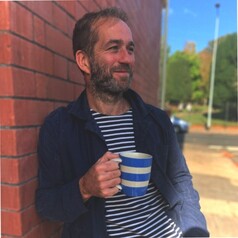
Joe Towns
Senior Lecturer in Sport Broadcasting, Cardiff Metropolitan University
After graduating from Loughbourough and working as a journalist with the South Wales Evening Post, I then spent 2001 to 2016 as a TV Sports producer in the broadcast industry. Primarily working at Sky Sports (2001-2007) and BBC Sport (2007-2016) but have also worked for Eurosport, IMG and BTSport. Highlights include producing live coverage of the Olympic Games 2012 & 2016 & 2024, Commonwealth Games 2010 & 2014, Wimbledon 2008-2016, Open Golf, Six Nations Rugby & FA Cup Football. I was series producer of ScrumV 2010-2016, responsible for ScrumVLive, ScrumV Sunday and Scrum V Six Nations Special. Also created, launched and produced the BBC Wales TV programmes Sports Wales and the annual Welsh Sports Review.
Since moving into academia I have continued to work in broadcast, mostly as an Executive Producer on sports documentaries including Elis James: Football Nation, Together Stronger and the Being Louis Rees Zammit film. This summer I'll be working for the Olympic Broadcast Services at the Paris Olympics.
At Cardiff Metropolitan University I designed and delivered their Sport Broadcast MSc and the Sport Media BSc. I am a Programme Director and Inovation Lead for Media at the School of Sport and Health Sciences. I sit on the boards of the RTS Cymru Wales, the Welsh Sports Hall of Fame and the Media Cymru Skills Advisory Board.
Less ![]()

Joe Wright
Professor of Political Science, Penn State
I teach in the Department of Political Science at Pennsylvania State University and currently serve as the co-Director of the Global and International Studies (GLIS) program. I previously held the Jeffrey L. and Sharon D. Hyde Early Career Professorship. I completed my Ph.D. at UCLA . Prior to arriving at Penn State, I was a post-doctoral research associate at Princeton University and a visiting faculty fellow at the University of Notre Dame. In 2016 I was on leave in Cape Town as a visiting scholar at Economic Research Southern Africa (ERSA).
My first book (with Abel Escriba-Folch), Foreign Pressure and the Politics of Autocratic Survival (Oxford University Press, 2015) examines how foreign policy tools destabilize dictatorships. This book won the 2017 Stein Rokkan Prize for Comparative Social Science Research. A second book, with Barbara Geddes and Erica Frantz, is How Dictatorships Work (Cambridge University Press, 2018). A third book, Migration and Democracy: How Remittances Undermine Dictatorships (co-authored with Abel Escriba-Folch and Covadonga Meseguer), will be published by Princeton University Press. A current book project is Personalist Parties and the Death of Democracy. Recent research has also been published in the American Journal of Political Science, Foreign Affairs, International Studies Quarterly, the Journal of East Asian Studies, Journal of Democracy, and the Journal of Politics. My research has been funded by the National Science Foundation and the Minerva Research Initiative.
Less ![]()

Joel Cabrita
Associate Professor of History, Director of the Center for African Studies, Stanford University
Joel Cabrita is a historian of modern Southern Africa who focuses on Eswatini (formerly Swaziland) and South Africa. Her most recent book is Written Out: The Silencing of Regina Gelana Twala (Ohio University Press, 2023). Twala was an unjustly neglected Black African literary figure in apartheid South Africa and colonial Swaziland (now Eswatini). The book shows that her posthumous obscurity has been no accident, charting how white scholars and politicians used racial and gendered prejudices to erase Twala’s work and claim her uncompensated intellectual labor for themselves.
Cabrita's other publications include The People’s Zion: Southern Africa, the United States and a Transatlantic Faith-Healing Movement (Harvard University Press, 2018) which investigates the convergence of evangelical piety, transnational networks and the rise of industrialized societies in both Southern Africa and North America. The People's Zion was awarded the American Society of Church History's Albert C Outler Prize for 2019 https://churchhistory.org/grants-and-awards/ She is also the co-editor of a volume examining the global dimensions of Christian practice, advocating for a shift away from Western Christianity to the lateral connections connecting southern hemisphere religious practitioners (Relocating World Christianity, Brill, 2017).
Cabrita has a long-standing interest in how Southern Africans used and transformed a range of old and new media forms. Her first book (Text and Authority in the South African Nazaretha Church, Cambridge University Press, 2014) investigates the print culture of a large South African religious organization, while her edited collection (Religion, Media and Marginality in Africa, Ohio University Press, 2018) focuses on the intersection of media, Islam, Christianity and political expression in modern Africa.
Cabrita did her PhD at the University of Cambridge and was subsequently a Junior Research Fellow at Trinity College, Cambridge. Before moving to Stanford, she held permanent posts at SOAS (University of London) and the University of Cambridge. Her research has been recognized by two major early-career research prizes, the British Arts and Humanities Early Career Research Fellowship (2015) and the Philip Leverhulme Prize (2017).
Less ![]()
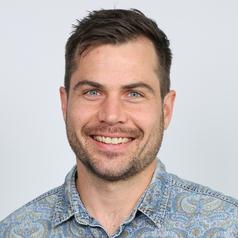
Joel Fuller
Senior Lecturer, Department of Health Sciences, Macquarie University
Dr Joel Fuller is a senior lecturer and qualified physiotherapist and sports scientist in the Faculty of Medicine, Health and Human Sciences at Macquarie University. He has expertise in research areas related to biomechanics, wearable technology, performance enhancement, and injury prevention and management. Joel is passionate about undertaking applied research that can be readily translated to practice. His unique blend of exercise science and clinical science knowledge, skills, and experience allow him to undertake innovative and impactful research at the critical intersection between these research areas.
Less ![]()

Joel Gray
Associate Dean for Teaching and Learning, Sheffield Hallam University
Joel is a researcher, teacher and passionate advocate of Media, Art and Communication at Sheffield Hallam University, and has a leadership role of Associate Dean in the College of Business, Technology and Engineering. His teaching is the subject of Public Relations to Journalism, Media and Marketing students. His research interests include sequential art and visual culture, popular culture and public relations/marketing strategy and campaigns.
Less ![]()

Joel Komakech
Assisstant Professor of Food Science, Nutrition and Health Promotion, Mississippi State University
A Public Health Nutritionist with experience in community nutrition, management of acute malnutrition, nutrition, and WASH programming in complex and emergencies. Enthusiast of research and teaching in Human Nutrition and Public Health; preferences in global nutrition, nutrition in emergencies, public health, and fundamentals of nutrition and human metabolism.
Less ![]()

Joel Mead
PhD Candidate in History, University of Liverpool
I joined the Department of History in October 2022 to conduct my doctoral studies under the supervision of Dr Chris Pearson (Department of History), Dr Mark Riley (Department of Geography and Planning) and Dr Sarah Arens (Department of Languages, Culture and Film).
Prior to this, I completed a BA in History at the University of Birmingham and an MA in Modern History at the University of Warwick.
My research interests include:
History of Consumer and Popular Culture
History of Food
History of Medicine
Animal History
Environmental History
Less ![]()

Joel Mero
Associate professor of marketing, University of Jyväskylä
Joel (Järvinen) Mero got his D.Sc. (Econ.) degree in 2016 at Jyväskylä University School of Business and Economics. Mero's research focuses on B2B digital marketing management (the managerial use of digital data and technologies in business markets). He has received the best paper award twice in the world's most prestigious academic B2B marketing journal, Industrial Marketing Management (2017 & 2019).
Mero leads Digital Marketing and Communication research group at JSBE and acts as the director of the international master's program in Digital Marketing and Corporate Communication (DMCC). With a special emphasis on digital marketing in teaching, Mero has designed and executed over 20 different study courses in more than 10 different higher-education institutions at Bachelor, Master, EMBA and Doctoral levels. He has also supervised several completed doctoral theses and dozens of master's theses.
Less ![]()

Joel Mier
Lecturer of Marketing, University of Richmond
Joel Mier is a Lecturer of Marketing at the Robins School of Business at the University of Richmond. He received his Doctorate in Business Administration from Georgia State University in 2016. His primary teaching responsibilities at the University of Richmond include teaching the Principles of Marketing and Strategic Marketing courses. Previously, Joel had taught a variety of marketing courses at the School of Business at Virginia Commonwealth University.
Joel has a rich practitioner background in marketing, spanning a wide variety of industries and company life stages. Most recently, he was the Vice President of Marketing of Contactually, a SaaS-based relationship marketing software firm in Washington, D.C. Prior, he was Vice President of Marketing at Genworth, a Fortune 500 global financial services company in Richmond, VA. Joel spent his early career in Silicon Valley at such firms as Gartner (Senior Market Analyst), Adobe (Senior Business Analyst), and Netflix (Director of Marketing).
Less ![]()

Joel Pearson
Professor of cognitive neuroscience, UNSW Sydney
Joel Pearson is a Psychologist, Neuroscientist and public intellectual working at the forefront of science, innovation and agile science.
Joel started his career studying art and filmmaking at one of Australia’s top fine arts school, Collage of Fine Arts, University of New South Wales. However, he then decided to apply his creative discovery techniques to the scientific mysteries of human consciousness and the complexities of brain. He completed his science PhD in 2 years, while fitting in several around the world trips and invited conference and university talks, alongside several publications.
An internationally recognised leader in human consciousness research, Pearson’s group takes an innovative, agile, first principles approach to developing new methods to measure dimensions of human experience previously thought to be immeasurable. A few examples are the group’s novel methods to measure the human imagination, intuition and hallucinations, using objective, reliable, neuroscientific methods. This work spans from fundamental science to helping individuals in the clinic – translational cognitive neuroscience.
Joel’s research has been recognised with major accolades including the 2009 William James award for the greatest scientific contribution to understanding consciousness. His team’s efforts have been featured in The Huffington Post, The Sydney Morning Herald, The Australian Financial Review, LiveScience, Discovery Channel, BBC and a host of other major media outlets.
Recognising that the most exciting and surprising scientific discoveries of the 21st century will likely involve a high number of accidental breakthroughs and large amounts of rapid iterative pilot testing. Joel is a passionate proponent of high-risk discovery science and has developed a method called Agile Science, a practical guide to both practicing and reporting scientific discoveries – the ‘Lean Startup’ for the world of science.
Joel takes a multidisciplinary agile approach to running his lab, bringing in staff and students from art, architecture, mathematics, computer science, psychology, neuroscience and medical imaging. The group studies many different exciting and cutting-edge topics, from new methods to map the human brain, treating mental illness, how to boost the human imagination and decision-making, to cognitive biases in financial risk assessment.
A prolific writer and speaker, Joel sits at the intersection between science, innovation and art.
Less ![]()
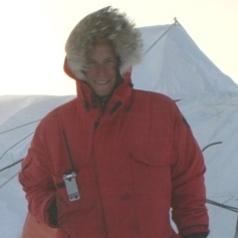
Joel Pedro
Palaeoclimatologist, Australian Antarctic Division
My research exploits high temporal resolution ice cores from Antarctica and Greenland to address questions concerning climate forcings, variability and feedbacks over a range of timescales: (i) sub-annual to decadal-scale environmental influences on the 10Be solar activity proxy; (ii) centennial to millennial-scale internal climate variability; and (iii) the phase relationship between Antarctic temperature and atmospheric CO2 during the last deglaciation.
Less ![]()

Joel Richter
Professor of Neuroscience, UMass Chan Medical School
We study the molecular biology of mRNA translational control by cytoplasmic polyadenylation and how this process influences interesting biological phenomena including early animal development, cellular senescence/growth control, neuron synaptic plasticity, learning, and memory, and neurologic disease.
Less ![]()

Joel Vallett
Assistant Professor of Public Administration, Southern Utah University
I am an Assistant Professor at Southern Utah University (SUU) and teach in the Master of Public Administration (MPA) program. My research focuses on policy incentives as a driving force for policy implementation, success, and ethical decision-making. I have been fortunate to publish articles in policy journals such as the Policy Studies Journal and Administration and Society. While I enjoy my research, my true passion lies in incorporating applied learning in the classroom. My goal is to cultivate dedicated public administrators equipped to tackle life's challenges.
Less ![]()

Joel Heng Hartse
Senior Lecturer, Faculty of Education, Simon Fraser University
Dr. Joel Heng Hartse is a Senior Lecturer in the Faculty of Education at Simon Fraser University courses. His research and teaching focuses on the teaching of language (especially writing) in the context of the internationalization of higher education, and his academic work has appeared in the TESL Canada Journal, Journal of Second Language Writing, Asian Englishes, Composition Studies, the Journal of English for Research Publication Purposes. Across the Disciplines, and English Today. His recent books include Dancing about Architecture is a Reasonable Thing to Do (Cascade, 2022), and TL;DR: A Very Brief Guide to Reading & Writing in University (On Campus/UBC Press, 2023. He is president (2022-2024) of the Canadian Association for the Study of Discourse and Writing, and former co-editor of the journal Discourse and Writing/Rédactologie.
Less ![]()
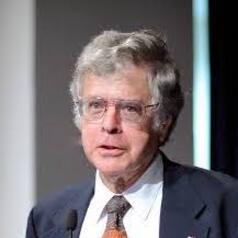
Joel S. Levine
Research Professor, Department of Applied Science, William & Mary
From 1970 to 2011, Dr. Levine was a Senior Research Scientist, Science Directorate, at the NASA Langley Research Center in Hampton, VA. From 2007-2010 he was a Program Scientist for the Mars Scout Program and Mars Exploration Program at the NASA Headquarters in Washington, D.C. From 1990-2011 he was an Adjunct Professor of Atmospheric Science in the Department of Applied Science at William and Mary in Williamsburg, VA. From 2011 to present he has been a Research Professor in the Department of Applied Science at William and Mary in Williamsburg, VA.
Less ![]()
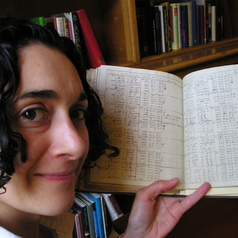
Joelle Gergis
ARC DECRA Climate Research Fellow, School of Earth Sciences, University of Melbourne
Dr Joëlle Gergis is a climate research scientist and writer working with Professor David Karoly at the University of Melbourne, Australia. Her research focuses on reconstructing Southern Hemisphere climate variability over the past 200–1,000 years using annually-resolved tree rings, corals, ice cores and historical records.
From 2009–2012 she led the Australian Research Council Linkage funded South-Eastern Australian Recent Climate History (SEARCH) project; a landmark initiative, spanning the sciences and the humanities to reconstruct the region’s climate variability from first European settlement in 1788.
Since 2009 Joëlle has led the international Past Global Changes (PAGES) working group on Australasian climate variability of the past 2,000 years (Aus2K). This involved coordinating the development of the region’s 1,000 year temperature reconstruction for input into the Intergovernmental Panel on Climate Change (IPCC) Fifth Assessment Report.
Joëlle received her PhD in high-resolution palaeoclimatology from the University of New South Wales in 2006. Since 2003 she has authored over 60 articles on climate variability and change publications. Her work has been covered on national and international television (SBS World News, ABC, TVNZ), radio (ABC Radio National, AM, Bush Telegraph, Science Show, RRR) and print media (The Guardian, The Australian, The Age, Sydney Morning Herald and Australian Geographic).
In 2007 she was one of three national finalists for the 2007 Eureka Prize for Young Leaders in Environmental Issues and Climate Change, and was one of nineteen Wentworth Group of Concerned Scientists’ Science Leaders Scholarship recipients selected nationwide. Professor Tim Flannery, the 2007 Australian of the Year, was one of her mentors during the program aimed at training outstanding young scientists to help bridge the communication gap between science and public policy.
In 2012 Joëlle was awarded an Australian Research Council (ARC) Discovery Early Career Researcher Award (DECRA) fellowship, and her team won the 2014 Eureka Prize for Excellence in Interdisciplinary Scientific Research – informally known as the ‘Oscars of Australian Science’. Most recently Joëlle was awarded the 2015 Dean’s Award for Excellence in Research in the Faculty of Science at the University of Melbourne.
Less ![]()

Joelle Grogan
Head of Research, Senior Researcher, UK in a Changing Europe, King's College London
Joelle is a Head of Research and a Senior Researcher at UK in a Changing Europe. She is an expert in the rule of law, working in the fields of EU law, and UK public law. She is also a Senior Research Fellow at the CEU Democracy Institute in Budapest, and a Visiting Senior Research Fellow at the UCD Sutherland School of Law in Dublin. She is a legal academic with expertise in EU and UK law.
Less ![]()

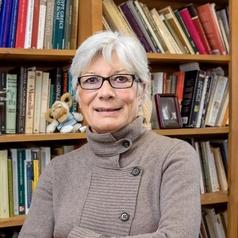
Joelle Rollo-Koster
Professor of Medieval History, University of Rhode Island
Socio-cultural historian of the late middle ages with an emphasis on the Avignon papacy and the Great Western Schism.
Less ![]()

- Market Data


















